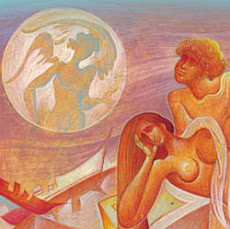The first thing we must have if we are going to have the true interpretation of the signs of the times is something we can call basic Orthodox knowledge. That is, knowledge of the Holy Scripture, both the Old and New Testaments (and not just according to the way it seems, but according to the way the Church has interpreted it); knowledge of the writings of Holy Fathers; knowledge of Church history; and awareness of the different kind of heresies and errors which have attacked the Church’s true understanding of dogma and especially of the last times. If we do not have a grounding in sources such as these, we will find ourselves confused and unprepared. That is precisely what our Lord tells us: to be ready, to be prepared. Unless we have this basic knowledge, we will not be prepared and we will misinterpret the signs of the times.
A few years ago a book was printed in English which has become a fantastic bestseller for a religious book. It has sold over ten million copies in America. It’s called The Late Great Planet Earth by Hal Lindsey, a Protestant Evangelical in Texas. In a rather superficial style he gives his interpretation of the signs of the times. He believes it’s the last times we are living in now. He believes that everywhere around us there are being fulfilled these signs which our Lord talked about. If you read this book, you find that sometimes he gets something more or less correct according to our Orthodox understanding, sometimes he is totally off, and sometimes he is partly wrong, partly right. It’s as though he’s just guessing, because he reads the Scripture according to his own understanding. He has no basic Orthodox Christian knowledge, no background in the true knowledge of the Scriptures and the Holy Fathers. Therefore, if you read this book seriously, you will find that you become very confused. You don’t know what to believe any more. He talks, for example, about a millennium which is supposed to come before the end of the world. He talks about the rapture, when Christians are supposedly gathered up into the heavens before the end of the world, and then watch how the people suffer down below. He talks about the building of the Temple in Jerusalem as though this is a good thing, as thought this is preparing for Christ’s coming.
If you read such books as this (there are many other books like it; this one happens to be a bestseller because the author caught the imagination of people just at one particular time), and if you take them all as truth, you will find that instead of recognizing Christ—which is the whole reason for our understanding about the signs of the times—you will be accepting Antichrist.
Take, for example, the very question of the Temple in Jerusalem. It is true, according to Orthodox prophecies, that the Temple will be rebuilt in Jerusalem. If you look at people like Hal Lindsey, or even the Fundamentalist Carl McIntire, they are also talking about the building of the Temple, but they’re talking about it as though we are building it in order for Christ to come back and reign over the world for a thousand years. What they are talking about is the coming of Antichrist. The millennium, according to the Protestant interpretation, as being a special thousand-year reign at the end of the world, is actually the reign of Antichrist. In fact, there have already been people who have arisen and proclaimed their thousand-year kingdom which is going to last until the end of the world. The last one was Adolf Hitler. This is based upon the same kind of chiliastic idea: that is, interpreting the millennium in a worldly sense. The actual thousand years of the Apocalypse is the life in the Church which is now, that is, the life of Grace; and anyone who lives it sees that, compared to the people outside, it is indeed heaven on earth. But this is not the end. This is our preparation for the true kingdom of God which has no end.
There are many books of basic Orthodox knowledge now available. Those who are seriously concerned about studying the signs of the times should first be very well versed in some of these books, and they should be reading them, seriously studying them, and having them as daily food. The best books to read are not someone’s interpretation of Revelation (the Book of Apocalypse), because right now there’s not really any Orthodox interpretation of this in English.2
The best books are the basic spiritual textbooks. First of all there are basic texts of Orthodox dogmas, the various catechisms. One of the best is the eighth-century work of St. John Damascene, On the Orthodox Faith, which goes through the whole of the catechism. An even earlier one is St. Cyril of Jerusalem’s Catechetical Lectures, that is, lectures prepared for people about to be baptized, which goes through the whole Creed and tells what the Church believes. There are many similar books of catechism, both in ancient times and in more modern times. More recently we have the catechisms in Russian of Metropolitan Platon and Metropolitan Philaret, which are a little shorter and simpler.
Then there is a different kind of book: commentaries on Holy Scriptures. There are not too many of these in English,3 but we do have some of the commentaries of St. John Chrysostom. This area is a little bit weak in English, because there are many good books in Russian which are not in English yet, including more recent books of commentaries on the Scriptures, even on the Apocalypse. Archbishop Averky’s books are very good, but they’re just being put into English now. God willing, before too long, they will be out.4
Then, besides these two kinds of books—basic catechism and commentaries on Scripture—there are all the books on Orthodox spiritual life. These include the Lausiac History (which tells about how the monks lived in Egypt, and how they fought spiritually), the Dialogues of St. Gregory of Rome, the Lives of Saints, The Ladder of St. John, the Homilies of St. Macarius the Great, the books of St. John Cassian, the Philokalia, Unseen Warfare and St. John of Kronstadt’s My Life in Christ. These books deal with basic Orthodox spiritual life, spiritual struggle, how to discern the wiles of the demons, how not to fall into deception. All of them give a basic foundation by which to understand the signs of the times.
Then there are the works of more recent writers who are in the same patristic spirit as the ancient Holy Fathers. The main examples are the two great writers of 19th-century Russia, Bishop Theophan the Recluse and Bishop Ignatius Brianchaninov,5 whose works are now coming out gradually in English. Bishop Ignatius’ book The Arena and various articles by Bishop Theophan are in English.6 These two writers are very important because they transmit the patristic teaching down to our times. They have already explained many questions which arise concerning how to understand the Holy Fathers. For example, the new Orthodox Word has a whole text of Bishop Ignatius on the toll-houses which the soul meets after death. Sometimes, in reading the Holy Fathers, one has questions on such subjects and doesn’t quite know how to understand what the ancient Fathers say, and these more recent Father explain these texts.
There are the histories of the Church, which tell of God’s revelation to men and how God acts with regard to men. It is very instructive to read the stories of the Old Testament, because exactly the same things repeat themselves in the New Testament. Then one should read, along with he New Testament, the histories of the New Testament Church. For example, there’s a pocketbook of Eusebius’ History of the Church, which traces the history of the Church down through the first three centuries, written from an Orthodox Christian point of view.7 It’s very important to see what early Church writers saw was important in the history of the Church: the martyrs, the apostles, and so forth.
So all these different kinds of writings help to prepare us with basic Christian knowledge, that is, catechisms, commentaries on Scripture, books on spiritual life, more recent patristic books in this same spirit, and histories of the Church. Before we do too much reading about what specifically the signs of the times mean, we should have a basic background in all of these categories of books. All of them prepare one to understand something about the signs of the times. Once one has begun to prepare oneself like this, it is not merely a matter of adding knowledge up in one’s head and being able to repeat by heart certain phrases, to have exactly the right interpretation of a Bible verse, or anything of the sort.
to be continued…

















































Δεν υπάρχουν σχόλια:
Δημοσίευση σχολίου